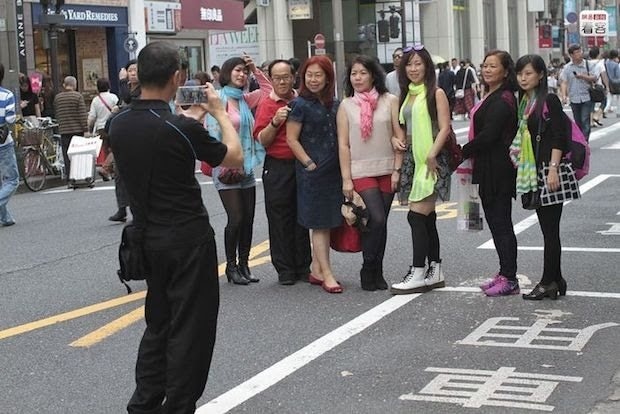
This article was published earlier in our weekly newsletter. Sign up through our “Newsletter Sign Up” box on the right.
From high-tech toilet seats to Hermès bags, Chinese travelers’ buying spree in Japan is likely to continue through next year.
Chinese tourists flooding into Japan was such a prominent story this year that the term bakugai, or “explosion buying” used to refer to their spending habits, was listed as Japan’s “buzzword of the year” this week. Called baomai in Chinese, the importance of the term is a reflection of the fact that Chinese tourist spending increased threefold in the second quarter of this year, totaling ¥358.1 billion (US$2.9 billion). This marks the most of any nationality at 40.3 percent of the total.
This week, the Japan National Tourism Organization also reported that China is now the number one source of foreign travelers from Japan. From January to October this year, 4.3 million mainland Chinese tourists visited Japan, marking 25 percent of all foreign visitors.
Signs are pointing to continued growth next year. Hong Kong, another easy-to-reach shopping destination for mainlanders, is expected to see a continued decrease in mainland Chinese tourist spending. CBRE predicted this week that retail rents in Hong Kong will decline by 15 to 20 percent in 2016 after decreasing by 20 percent in 2015. Europe, another popular shopping destination with Chinese tourists, may also suffer in the wake of the recent attacks in Paris.
Chinese tourists’ safety concerns make Japan extremely attractive due not only to the Paris attacks, but also due to the recent bombing in Bangkok, another top Chinese tourist destination. Hong Kong also presents a safety concern for Chinese travelers after the recent death of a Chinese tourist in Hong Kong after a fight on a “forced buying” tour, as well as anti-mainland protesters’ harassment of mainland tourists this year.
In addition, the Chinese anti-Japan boycotts over the Senkaku Islands dispute aren't likely to be repeated in the near future at least as Sino-Japan relations have thawed this year.
But one caveat is the fact that Chinese tourism to Japan is by no means 100 percent secure. China's recent military parade celebrating victory over Japan and ongoing territorial claims mean that political tensions could arise again in the future. In addition, currency fluctuations are known to have a huge effect on Chinese tourists’ travel plans, meaning that they’ll be more than willing to head to another location if the price becomes more attractive.